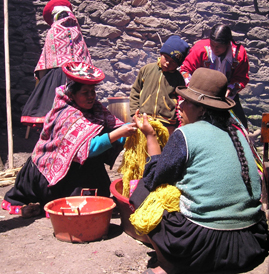Andean indigenous village modernization topic of Jan. 15 Cultural Affairs Council presentation
January 7, 2009
The Idaho State University Cultural Affairs Council will present “Modernization and Globalization in an Andean Indigenous Village,” a digital photo presentation and talk by Katharine Seibold, Ph.D., at 7:30 p.m. Jan. 15 in the Pond Student Union Salmon River Suite.

Seibold is an anthropology professor at Albertson College of Idaho. She recently returned from a two-year sabbatical in Peru to the cities of Cuzco and Choquecancha, the latter a high Andean village where she has studied modernization for more than 20 years. Entry into this native culture has been facilitated by her ability to speak Quechua and Spanish.
Professor Seibold’s analysis focuses on the increasing interaction of an indigenous village in the Peruvian Andes with the Peruvian state and the global economy.
“Change in the peasant community, Choquecancha, is externally pushed by teachers and development agencies, but also it is internally generated by their desire to modernize, as they embrace individualism, consumerism and materialism,” Seibold said.
The people of Choquecancha are changing from peasants to capitalists, from a community unaware of what they shared with other Quechua speakers to members of a pan-ethnic group and simultaneously, to a lower Peruvian social class, Seibold said.
“Their challenge is to figure out how to move into the world system with all its values and ways of doing things without losing their unique Andean culture including their ecologically sound farming practices, their values of community, reciprocity, gender complementarity, and their belief in a sacred, loving landscape,” Seibold said. “Hand-woven textiles, once solely produced to clothe the family and now produced for the high end international market, can be one means, among many, to achieve this.”
For more information, contact Ann Hunter, chair of the ISU Department of Sociology, Social Work and Criminal Justice, at 282-3463.
Categories:
